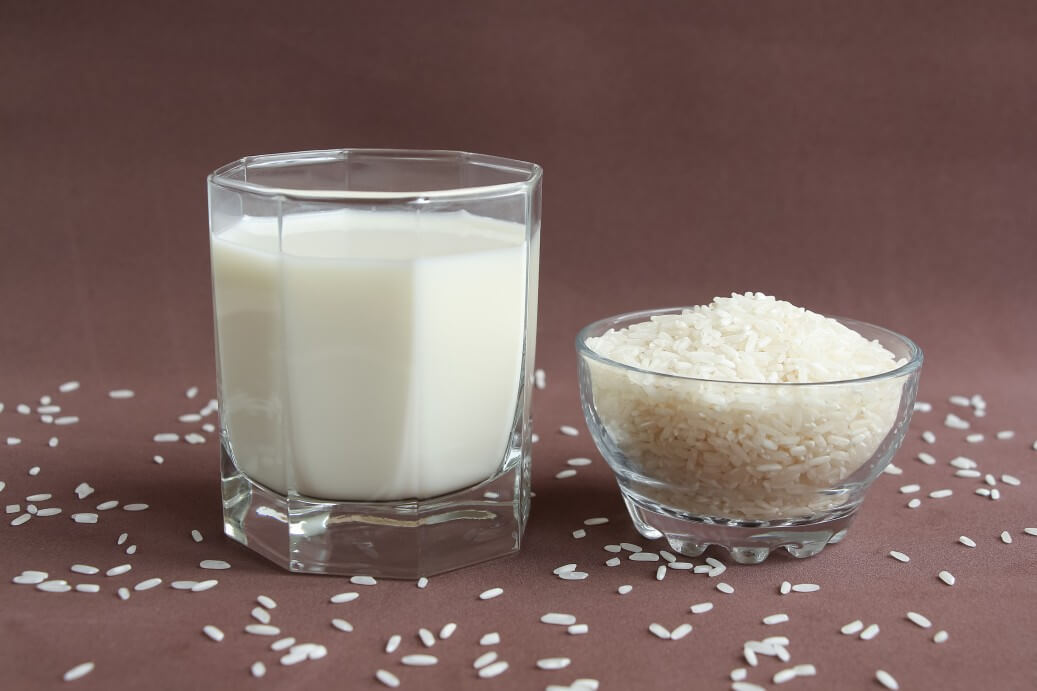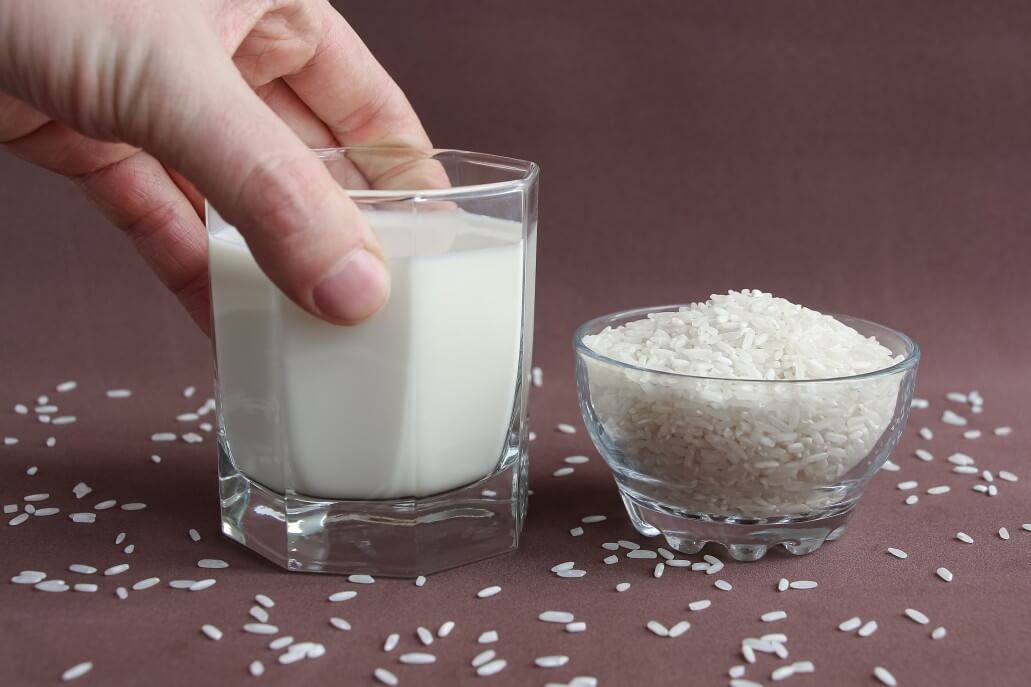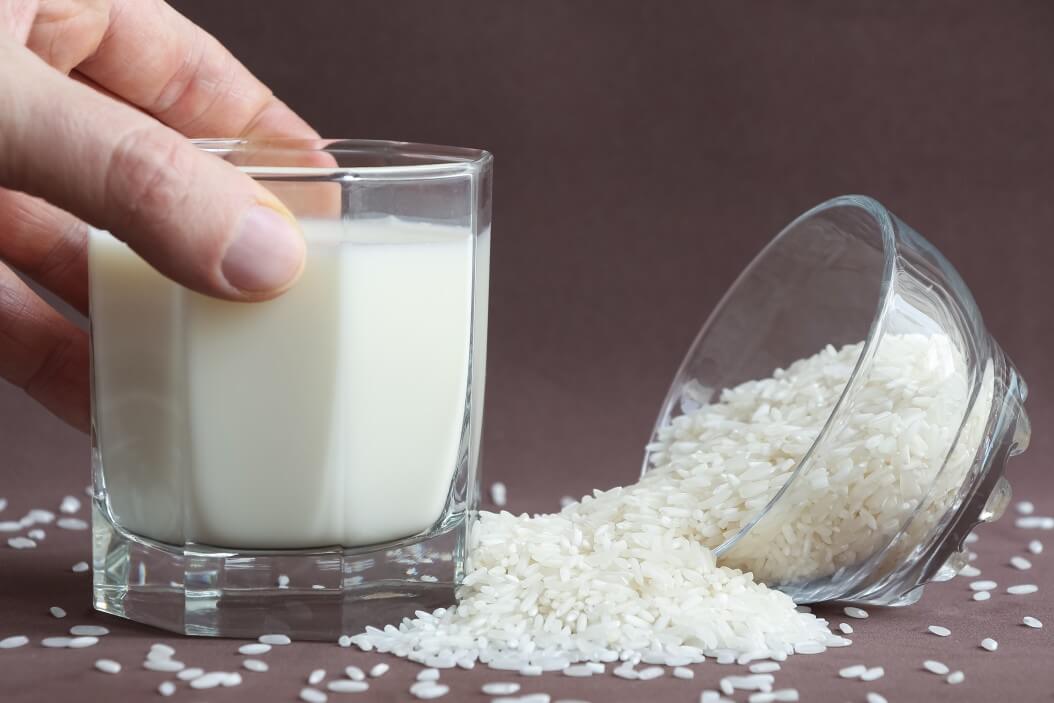Rice Milk
Allergen-Free
Rice milk is free of gluten, soy, and nuts, making it an allergy friendly milk.
Energy Boost
The higher-carb count makes rice milk good active people who need a boost.
Antioxidants
Rice milk contains antioxidants that may strengthen your immune system.
Have you ever stood in front of the alternative milk section of your grocery store and thought "How can they milk rice?".
Maybe you've been confused by all the options claiming to be milk. Soy, almond, oat, hemp, rice milk. Navigating the plant-based alternative milk world can be confusing.
So, for rice sakes, how do you figure it all out? And what is rice milk? Keep reading for the 411 on this plant-based product.
What is Rice Milk?
Rice milk is a plant-based cow's milk alternative. It's usually made from brown rice and infused with vitamins. Rice milk has a thin texture comparable to skimmed or fat-free milk.
Rice milk tastes sweeter than cow's milk but not as sweet as some vanilla-flavored soy or almond milk. Unless, of course, it's been sweetened by honey, dates, sugar, or other yummy additives.
Watch our Rice Milk 101 video for more info on the basics of rice milk.
Rice Milk Nutrition Facts
When looking at nutrition facts, it's easy to see why people enjoy rice milk as an alternative. It's low in fat and calories. Since it's infused with vitamins, most rice milk contains calcium, magnesium, phosphorus, potassium, and other vitamins.
Rice Milk Nutrition Facts | |
|---|---|
Calories | 115 |
Protein | <1g |
Fat | 2g |
Carbohydrates | 22g |
Fiber | <1g |
Sugar | 13g |
Calcium | 288mg |
Potassium | 65.9mg |
Iron | <1mg |
Sodium | 95mg |
Magnesium | 27mg |
The Benefits of Rice Milk
Rice milk has plenty of benefits for anyone looking for a non-dairy milk option. Here are a few reasons to give rice milk a try.
Allergen-Free
Rice milk is gluten-free, soy free, and nut free, which makes it a good option for people with food allergies.
Energy Boost
Rice milk has a higher carb-count than most plant-based milk, which can be a good or bad thing depending on your goals. However, if you're active and looking for a milk to add to a pre-workout shake, rice milk might be an option you haven't considered.
Antioxidants
Rice milk is packed with antioxidants like manganese and selenium, which may help your body defend against infections and strengthen your immune system.
The Downsides of Soy Milk
One person's upside is another person's disadvantage. If you're living a vegetarian or vegan lifestyle, don't plan to pack protein from rice milk. While many rice milk brands are infused with vitamins, they usually don't add protein.
The same can be said for fat content.
Recent studies suggest drinking full-fat milk in moderation may have health benefits. If you're looking to avoid any kind of saturated or nonsaturated fat, this downside for some would be an advantage for you.
One thing most people can agree upon? Added sugar isn't good for you.
Unfortunately, rice milk tends to have higher sugar content than other types of milk. Rice milk has nearly five times as much added sugar as unsweetened soy milk and almond milk.
Beware of Blood Sugar
Due to its high glycemic index (85 GI), rice milk can cause blood sugar spikes. That's why it may not be a great idea for those living with diabetes to drink a lot of rice milk.
It's always important to consult with your healthcare provider if you have special health considerations. What's healthy for one person may be harmful to another.
How To Make Rice Milk
There's no better way to find the answer to the question, "what is rice milk?" than to make it yourself. Maybe you just like being adventurous with food. Maybe you just want to save a little money (inflation, right!?).
Making your own rice milk isn't too difficult. It requires rice, water, a cheesecloth/fine strainer, and a blender or food processor. Check out this rice milk recipe.

Ingredients
- 4 cups water
- 1 cup cooked white or brown rice
Brown rice might require more liquid than white rice. Be prepared to adjust the amounts to get the desired texture.
Equipment Needed
- High-speed blender
- Cheesecloth, nut milk bag or mesh strainer
Instructions
Step 1
Combine the water and rice into a blender.
Optional: Add honey, dates, or any other sweeteners to taste.
Step 2
Blend for two minutes or until smooth.
Step 3
Pour over a cheesecloth or fine strainer into a pitcher
Step 4
Pour the milk into an air-tight container and store in the fridge for up to five days.
When using brown rice, you may have to pick out some chunks after you've strained the rice milk a few times. Just toss it in the compost and call it good!
The disadvantage to making your own rice milk? It's usually not fortified with vitamins like store brands are. However, knowing how to make your own rice milk can come in handy when you need can't find any locally.
How to Use Rice Milk in Recipes
Since rice milk isn't quite as thick or creamy as whole milk, we recommend thickening it up before using it in recipes.
Combine rice milk with vinegar or lemon juice and let sit for 10 to 15 minutes. The acidic properties in vinegar or lemon juice react with the basic properties of rice milk. The result is a thicker, creamier texture.
Rice milk plus vinegar/lemon juice works great as a substitute for buttermilk or full-fat milk in your baking adventures. Here are a few ways you can use rice milk instead of cow's milk.

Cream of Whatever Soup Sub
If you're avoiding dairy, you're likely frustrated with the number of recipes that call for cream of mushroom/chicken/anything soup. Good news! You can use rice milk to make your own substitute.
Melt a little bit of butter or some oil in a saucepan on medium-low heat. Slowly add in rice milk and flour alternately, stirring with a whisk. Once you've reached the desired consistency, remove from heat and add to your soup or casserole recipe.
Baking With Rice Milk
Rice milk may be a great swap for some recipes calling for milk. If you're looking to substitute for coconut milk, buttermilk, or creamy soy milk, you may be disappointed.
Because of its thin consistency, rice milk doesn't work as a substitute for other kinds of full-fat milk. Trying to swap rice milk for creamier milk types almost always results in failure to rise, bind, bake, or all three!
Baking disasters sometimes result in some colorful language. You've been warned. Send the kids outside for a while.
Using Rice Milk For Shakes
Rice milk can be a great way to make that dairy-free shake you've been craving. Grab your favorite brand of dairy-free ice cream, a blender, and add rice milk. Blend together until you've got the consistency you want.
For something extra-sweet, add chocolate or strawberry syrup. It's easy to mix and match flavors because rice milk doesn't add overpowering flavors to the mix.
Good Morning, Sunshine!
You don't have to miss out on your favorite waffles, pancakes, and french toast.
Use the buttermilk trick with lemon juice or vinegar to make fluffy pancakes and waffles. Combine vanilla, cinnamon, eggs, flour, and rice milk to make yummy french toast.
Need a little extra something in that coffee? Try out a splash of rice milk in there to complete your morning breakfast ensemble.

Rice Milk FAQ
If you are new to the world of dietary restrictions, you may have some questions about rice milk. Here are some common queries about these plant-based products.
Is Rice Milk Good for You?
The simple answer? It depends on who you are.
Those with multiple food allergies may only have a few safe milk substitute options. Cow's milk, soy, and tree nuts (almond, cashew, etc...) all fall in the top nine food allergies in the US. This leaves a few plant-based options, and rice milk as safe swaps for baking, cooking, and drinking.
Others may have medical conditions in which drinking rice milk is not good for them. Individuals who need to watch their blood sugar or carbohydrate intake may fall into this camp. If that's the case, it's best to seek out other milk options with the help of your healthcare provider.
Is Rice Milk Healthier Than Regular Milk?
For those who have an allergy to regular milk or lactose intolerance, yes, rice milk is healthier. Individuals with high cholesterol may also find rice milk healthier than cholesterol-containing regular milk.
Even those without diagnosed medical reasons may find they feel better after drinking rice milk than regular milk.
However, for individuals who do not have special dietary needs, cow's milk may lower inflammation and provide vitamins helpful for growth and development. Regular milk is also relatively low in sugar and a great source of calcium. Overall, regular milk has many proven health benefits.
If you're asking for your kids, follow the science. The CDC recommends children have the right amounts of cow's milk at the appropriate ages.
For those following a vegan lifestyle, avoiding milk is important. Some studies have linked cow's milk to increased acne in adolescent populations as well. Rice milk also contains inositol, which some studies suggest has several health benefits. These findings are mostly preliminary as high-inositol diets aren't widely studied yet.
Is Rice Milk Good for Weight Loss?
Rice milk can be an excellent way to cut calories and fat from your daily diet. When combined with healthy grain-based cereal, it makes a yummy breakfast. Replace your full-fat coffee creamer with rice milk for a lower calorie option.
If you're replacing higher fat options with rice milk is a part of your new, healthy lifestyle routine. Rice milk may be a way to help you towards a nutirious weight loss journey.
Relying on rice milk as a replacement for any kind of milk? That's a more nuanced discussion.
Always consult with your healthcare provider about any changes in your diet. This includes any new weight loss plans or goals. Rice milk is great but there's no secret sauce for weight loss.
Is Rice Milk Really Milk?
The FDA defines milk as lacteal secretion, practically free from colostrum, obtained by the complete milking of one or more healthy cows.
This definition works for traditional cow's milk. The FDA has considered updating this definition with the rise of plant-based alternatives.
So, do they really milk all these plants? In a way, yes. Rice milk, for example, is a product of rice mixed with water. By the time it hits your grocery refrigerator, rice milk has been through processes to optimize flavor and nutrition.
As of now, the FDA hasn't updated its official milk definition. So, unofficially, non-animal milk is a liquid-based product derived from a plant or grain.
Is Rice Milk Good For Babies?
According to the FDA, rice milk should not be used as a substitute for formula or breastmilk. Infants need specific amounts of nutrients not found in rice milk. Always consult a pediatrician before swapping or introducing new foods to your baby's diet.
Ready to Give Rice Milk a Try?
So what is rice milk? Rice milk is a product of cooked rice, water, a little flavor, and added vitamins.
Rice milk serves as an excellent alternative for those who are lactose intolerant or have food allergies.
Rice milk offers a great dairy-free baking and cooking alternative. Add it to your favorite recipe or thicken it with vinegar to substitute buttermilk.
Want to learn about other types of plant-based milk? Check out our guides below!

